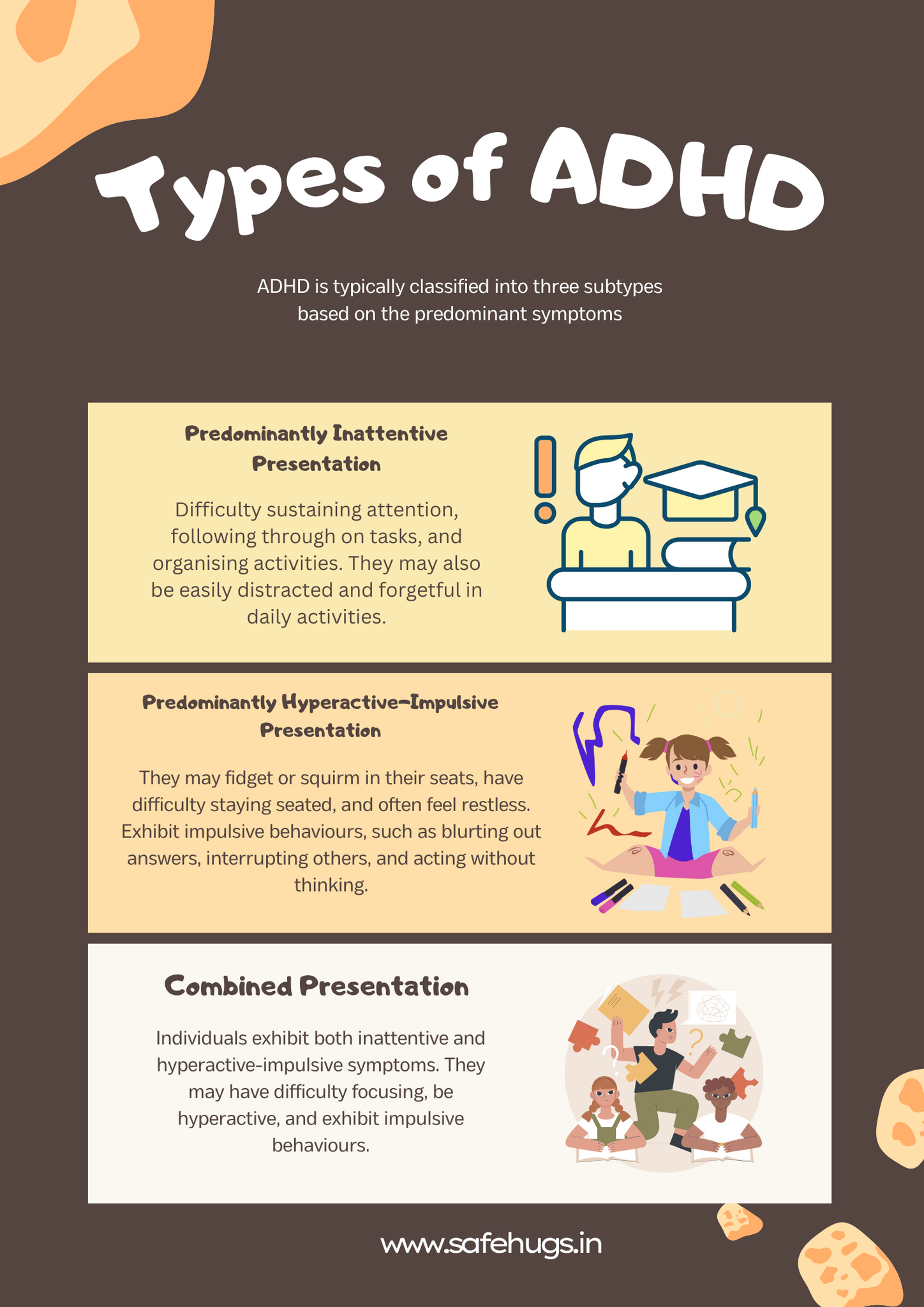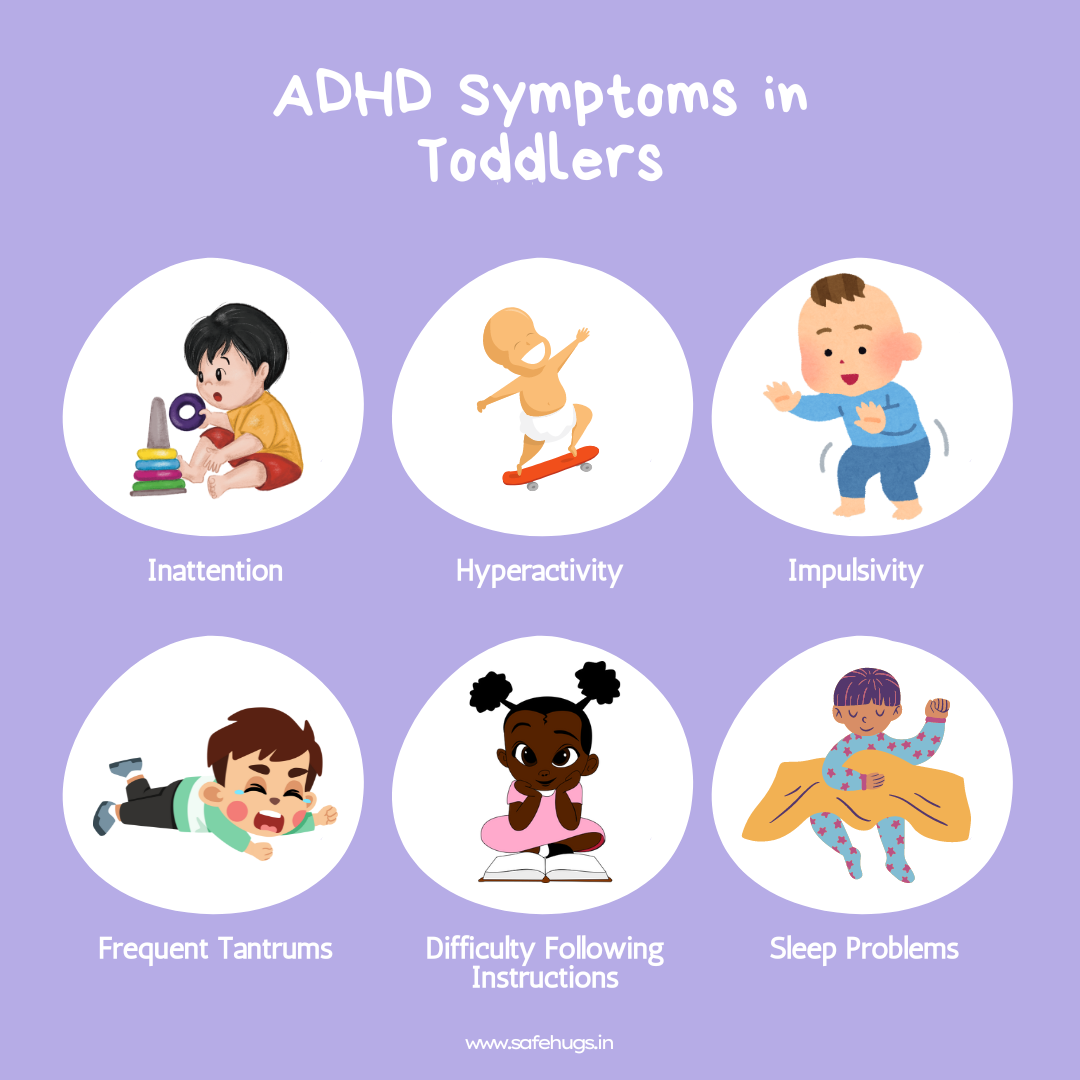ADHD Symptoms In Toddlers, Children, Adolescents and Adults
ADHD, or Attention-Deficit/Hyperactivity Disorder, is a neurodevelopmental disorder characterised by persistent patterns of inattention, hyperactivity, and impulsivity that can impact daily functioning. Recognizing and understanding the symptoms of ADHD is crucial for early intervention and effective management. In this guide, we'll explore the common symptoms of ADHD, its impacts, and strategies for coping and managing the disorder.
Types of ADHD

ADHD, or Attention-Deficit/Hyperactivity Disorder, is typically classified into three subtypes based on the predominant symptoms:
- Predominantly Inattentive Presentation (ADHD-PI): Individuals with this subtype primarily have symptoms of inattention. They may have difficulty sustaining attention, following through on tasks, and organising activities. They may also be easily distracted and forgetful in daily activities.
- Predominantly Hyperactive-Impulsive Presentation (ADHD-PH): Individuals with this subtype primarily have symptoms of hyperactivity and impulsivity. They may fidget or squirm in their seats, have difficulty staying seated, and often feel restless. They may also exhibit impulsive behaviours, such as blurting out answers, interrupting others, and acting without thinking.
- Combined Presentation (ADHD-C): This is the most common subtype, where individuals exhibit both inattentive and hyperactive-impulsive symptoms. They may have difficulty focusing, be hyperactive, and exhibit impulsive behaviours.
Common symptoms
The symptoms of ADHD can vary widely from person to person and may change over time. Here are some common symptoms associated with ADHD:
Inattention symptoms:
- Difficulty paying attention to details
- Trouble staying focused on tasks or activities
- Easily distracted
Hyperactivity symptoms:
- Forgetfulness in daily activities
- Fidgeting or squirming
- Difficulty staying seated
- Excessive talking or interrupting others
- Always on the go
Impulsivity symptoms:
- Impatient waiting for their turn
- Blurting out answers before questions are completed
- Difficulty following instructions or finishing task
ADHD symptoms in Toddlers

While ADHD is often diagnosed in school-aged children, symptoms can be noticeable in toddlers as well. According to a study published in the Journal of Attention Disorders, early signs of ADHD can be observed in toddlers as young as 12 to 24 months old. It's important to note that toddlers naturally have high levels of energy and can be easily distracted, so it's crucial to look for persistent patterns of behaviour that go beyond typical toddler behaviour.
Here are some common ADHD symptoms that may be observed in toddlers:
- Inattention: Toddlers with ADHD may have difficulty focusing on tasks or activities, such as playing with toys or listening to a story. They may seem easily distracted and frequently switch from one activity to another.
-
Hyperactivity: Hyperactivity in toddlers with ADHD may be observed as constant movement, such as running, climbing, or jumping excessively, even in situations where it's not appropriate. They may also have difficulty sitting still, such as during meal times or story time.
-
Impulsivity: Impulsivity in toddlers with ADHD may be seen as acting without thinking, such as grabbing toys from other children without asking or running into dangerous situations without considering the consequences.
-
Frequent Tantrums: Toddlers with ADHD may have more frequent and intense tantrums compared to other children their age. These tantrums may be triggered by frustration due to their difficulties with attention and impulse control.
- Difficulty Following Instructions: Toddlers with ADHD may have trouble following simple instructions or rules. They may seem to ignore or forget what they were told, leading to frustration for both the child and caregiver.
- Sleep Problems: Some toddlers with ADHD may have difficulty settling down at bedtime and staying asleep throughout the night. This can contribute to daytime irritability and difficulty focusing.
RELATED: ADHD treatment.
ADHD symptoms in Children
ADHD can affect children's behaviour and academic performance. According to the Centres for Disease Control and Prevention (CDC), ADHD is one of the most common neurodevelopmental disorders in childhood, affecting about 9.4% of children aged 2-17 years. While symptoms can vary, they generally fall into two categories: inattention and hyperactivity-impulsivity. Here are some common symptoms of ADHD in children:
Inattention:
- Difficulty paying attention to details or making careless mistakes in schoolwork or other activities.
- Trouble staying focused on tasks or play activities.
- Often seeming not to listen when spoken to directly.
- Difficulty following through on instructions and failing to finish tasks, such as homework or chores.
- Avoiding or disliking tasks that require sustained mental effort, such as schoolwork or homework.
- Losing things necessary for tasks and activities, such as school supplies, toys, or books.
- Being easily distracted by unrelated thoughts or stimuli.
Hyperactivity-Impulsivity:
- Fidgeting or squirming in their seats.
- Often leaving their seat in situations where sitting is expected, such as in the classroom or during meals.
- Running or climbing in situations where it is inappropriate or feeling restless.
- Being unable to play or engage in leisure activities quietly.
- Talking excessively.
- Blurting out answers before questions have been completed.
- Difficulty waiting their turn.
- Interrupting or intruding on others' conversations or activities.
It's important to note that these symptoms can vary in severity and may not be present all the time. Additionally, some children with ADHD may primarily exhibit symptoms of inattention, while others may primarily exhibit symptoms of hyperactivity-impulsivity.
ADHD symptoms in Adolescents
ADHD can present unique challenges for adolescents as they navigate the transition from childhood to adulthood. While symptoms of ADHD can vary widely among individuals, there are common signs and behaviours that may indicate the presence of the disorder in adolescents. Here are some common symptoms of ADHD in adolescents:
Inattention:
- Difficulty organising tasks and activities, such as completing homework assignments or chores.
- Forgetfulness in daily activities, such as forgetting to bring necessary materials to school or appointments.
- Difficulty sustaining attention in tasks or play activities, such as frequently switching from one activity to another.
- Avoiding or procrastinating tasks that require sustained mental effort, such as schoolwork or studying.
- Frequently losing items necessary for tasks or activities, such as school supplies or personal belongings.

Hyperactivity:
- Feeling restless or fidgety, such as tapping hands or feet or squirming in seat.
- Difficulty engaging in quiet activities or situations, often feeling the need to be constantly moving or doing something.
- Talking excessively or feeling the need to constantly be talking.
Impulsivity:
- Acting impulsively without considering consequences, such as blurting out answers in class or interrupting others.
- Difficulty waiting their turn in situations that require patience, such as waiting in line or during conversations.
- Engaging in risky behaviours, such as reckless driving or substance abuse.
| Dr. Kathleen Nadeau, a clinical psychologist and expert in ADHD in adolescents and adults, recommends that parents of adolescents with ADHD encourage independence and self-advocacy skills while providing guidance and support. |
Emotional and Behavioural Challenges:
- Difficulty regulating emotions, leading to mood swings, irritability, or outbursts of anger.
- Low self-esteem or feelings of inadequacy, especially in comparison to peers.
- Difficulty managing time and tasks, often feeling overwhelmed or disorganised.
ADHD symptoms in Adults
ADHD is often associated with children, but it can persist into adulthood and present unique challenges for adults in various aspects of their lives. The symptoms of ADHD in adults can manifest differently than in children and may impact work, relationships, and daily responsibilities. Here are some common symptoms of ADHD in adults:
Inattention:
- Difficulty organising tasks and activities, such as prioritising work or managing time effectively.
- Forgetfulness in daily activities, such as missing appointments or deadlines.
- Difficulty sustaining attention in tasks or activities, often leading to incomplete projects or work assignments.
- Easily distracted by unrelated thoughts or stimuli, making it challenging to focus on tasks at hand.
|
"As an adult with ADHD, learning about my symptoms has empowered me to seek strategies that work for me in managing daily tasks." - Individual with ADHD. |
Hyperactivity:
- Feeling restless or fidgety, such as tapping hands or feet or feeling the need to move constantly.
- Difficulty engaging in leisure activities quietly or relaxing without feeling the need to be constantly active.
- Talking excessively or feeling the need to constantly be talking.
Impulsivity:
- Acting impulsively without considering consequences, such as making hasty decisions or interrupting others.
- Difficulty waiting their turn in situations that require patience, such as waiting in line or during conversations.
- Engaging in risky behaviours, such as reckless driving or substance abuse.
Emotional and Behavioural challenges:
- Difficulty regulating emotions, leading to mood swings, irritability, or outbursts of anger.
- Low self-esteem or feelings of inadequacy, especially in comparison to peers.
- Difficulty managing time and tasks, often feeling overwhelmed or disorganised.
Relationship Challenges:
- Difficulty maintaining relationships due to impulsivity, inattention, or emotional dysregulation.
- Struggles with communication, such as interrupting others or being easily distracted during conversations.
- Feeling misunderstood or judged by others due to ADHD symptoms.
Diagnosis and Treatment
Diagnosing ADHD involves a comprehensive evaluation by a healthcare professional, including a review of symptoms, medical history, and standardised assessment tools. Treatment options for ADHD include medication, behavioural therapy, and lifestyle modifications. A multimodal approach that combines these strategies is often recommended for optimal outcomes.

Coping Strategies
Coping with ADHD involves implementing strategies to manage symptoms and improve daily functioning. These may include:
- Establishing routines and schedules to improve organisation and time management
- Breaking tasks into smaller, more manageable steps
- Using tools such as calendars, planners, and reminders to stay organised
- Seeking support from family, friends, and healthcare professionals
Understanding ADHD symptoms is the first step towards effective management and improved quality of life for individuals with ADHD. By recognizing the signs and seeking appropriate treatment and support, individuals with ADHD can learn to manage their symptoms and thrive in various aspects of life.





























